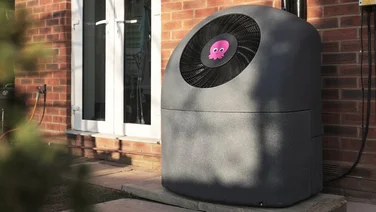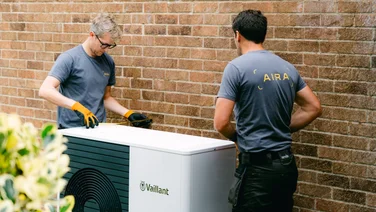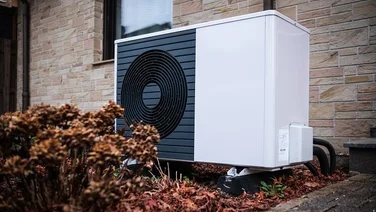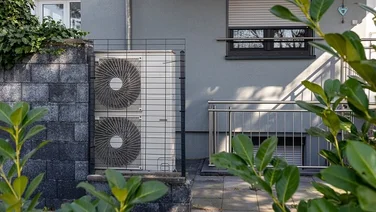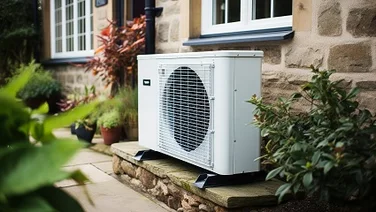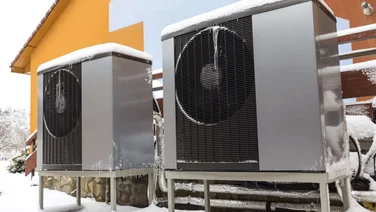We receive a small fee from trusted installers when you request a quote through our site. This helps us keep our content independent, well-researched and up to date – Learn more
- A 5kW air source heat pump will suit the average three-bed home
- If you have a large house, a 12kW or 16kW model is best
- Buying a heat pump will cut your carbon footprint by 44%, on average
Although heat pump costs can be high, they can collectively reduce tonnes of CO2 emissions and reliably keep homes warm for around 20 years.
Until 2027, the government’s Boiler Upgrade Scheme can cut your air source heat pump costs by up to £7,500.
You don’t just want any heat pump, though, you want the best heat pump, the one that’ll suit your home perfectly. More importantly, you want the right size air source heat pump for your home.
In this article, we give you all the information you’ll need on heat pump sizes, including how to work out what size heat pump you need, why it matters, and the best large and small heat pumps on the market.
If you’re interested in learning more about the best air source heat pumps in the UK, please read our dedicated guide.
If you’re looking for a quick answer before delving into the details, just use our custom-built tool.
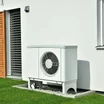
Get £7500 towards your heat pump installation through a trusted installer
An MCS-certified heat pump installer can apply for the Boiler Upgrade Scheme on your behalf, get a quote from one now
How big is a standard air source heat pump?

Air source heat pumps generally range from 5kW to 16kW. The bigger your home, the larger the number of kilowatts you’ll need.
Typically, a 100m² property with three bedrooms will require a 5kW air source heat pump, while a 200m² home will need a 10kW heat pump.
If you’re interested in new windows, have a look at our double glazing cost calculator.
A house that’s 250m² or larger may require a 12kW or even 16kW system.
In terms of physical size, your new air source heat pump will typically stand between 1 and 1.5 metres high, and between 0.5 and 1 metres wide, meaning it’s roughly the size of a standard washing machine.
They usually weigh between 60 and 100kg.
To find the right model for your home, check out our guide to the best air source heat pumps.
How to work out what size heat pump you need
If you have a new-build property, use the handy table below to get an idea of the typical size of air source heat pump needed for your home.
House size | Number of bedrooms | Air source heat pump size | Cost |
|---|---|---|---|
100m² | 3 | 5kW | £10,000 |
200m² | 4 | 10kW | £13,000 |
300m² | 5-6 | 16kW | £15,000 |
If your home isn’t new, you should get a heat pump company to provide you with a heat-loss assessment before they give you a quote for one of their products. You don’t want to get a heat pump installed, only to discover it’s too small to heat your home effectively.
A heat pump company can perform a calculation based on the age of the property, the number and size of its rooms and radiators and whether it has single or double glazing.
The company will also check your insulation level and whether you’ve installed underfloor heating pipes (this will only be relevant to ‘hydronic’ underfloor heating, which uses pipes to circulate hot water instead of electricity to heat wires, and would be connected to your heat pump).
If you have poor insulation and/or no underfloor heating system, you can still use a heat pump to warm your home – it’ll just need to be bigger to make up for these shortfalls. A poorly insulated property typically needs a heat pump 1.5 times the size of a well-insulated home.
That means a three-bedroom house will need a 5kW heat pump, unless its insulation levels are low, in which case it’ll usually require a 7.5kW machine. This will add to your initial costs, naturally.
For more information about how much you’ll pay, check out our guide to air source heat pump costs.
We also have a handy guide on insulation costs, to give you an idea of what you might spend making your house more energy efficient.

Get £7500 towards your heat pump installation through a trusted installer
An MCS-certified heat pump installer can apply for the Boiler Upgrade Scheme on your behalf, get a quote from one now
Why does heat pump size matter?
Buying an appropriately sized heat pump for your home will help you to avoid overpaying.
The average three-bedroom household can save up to £4,000 over 20 years by getting an air source heat pump instead of a gas boiler – but only if the heat pump is the right size. If you pay the £13,000 that a larger system typically costs, this will eat into your savings.
An unnecessarily big heat pump will also run in short cycles, which is bad news for the machine’s motor and may mean you have to replace the heat pump before its usual 20-year lifespan.
And if you get a heat pump that’s too small, it’ll run pretty much the whole time – trying to meet your heating needs – which will increase your heating bills.
How can you prepare your home for a heat pump?
To prepare your home for a heat pump, first turn the flow temperature of your boiler down to 50°C in winter.
If you don’t notice any negative effects, you’re ready for a heat pump and don’t need to install insulation or new radiators.
If you’re cold with the temperature set at 50°C, your home likely needs insulation, which will make your heat pump much more effective. Ideally you’d look into all of these, but any of them would improve the temperature of your home.
Getting radiators 2.5 times bigger than the standard size is a good shortcut to preparing your property for a heat pump, and can even reduce the size of the heat pump you need.
This is because larger radiators can disperse the same amount of heat over a longer period of time, which suits heat pumps perfectly. For more information, read our guide to using air source heat pumps with your radiators.
Make sure you also have enough room outside to fit a heat pump and identify a one metre by one metre space inside your home for a hot water cylinder.
We’ve written a guide on boiler controls if you’re looking for the basic ins and outs on adjusting boiler settings.
Pros and cons of a large heat pump
- Can reliably heat your home in almost any weather
- More efficient
- You can use all the electricity your solar panels generate
- More eco-friendly
- Futureproof against future boiler bans
- More expensive than a smaller model
- Higher energy bills
- Requires more space
Heat pump running costs
A ground source heat pump’s running costs for a three-bedroom household will typically come to around £939 per year.
The average air source heat pump will cost a little less to run – around £875 per year (based on the cost of electricity per kWh in April 2025). Exact running costs for both ground and air source heat pumps can vary significantly, depending on where you live in the UK.
| Heating method | Average monthly usage | Ofgem price cap 2025 | Standing charge | Monthly bill |
|---|---|---|---|---|
| Gas boiler | 960 kWh gas | 6.29p/kWh | 34.03p/day | £60.72 |
| Heat pump | 246 kWh electricity | 26.35p/kWh | 53.68p/day | £65.36 |
The best large heat pump on the market
The Grant Aerona³ R32 is the best large heat pump around, hands-down.
This 17kW air source model will comfortably heat practically any house with an incredible efficiency rating – it creates 4.79 units of heat for every unit of electricity it absorbs. It even works at temperatures as low as -20°C
At 120kg, it’s below average weight for its power, and you can even get a seven-year guarantee if it’s installed by one of Grant’s approved G1 tradespeople.
The Aerona³ R32 can be bought for an extremely reasonable £5,400, plus installation.
To see the other models we’ve chosen as our top picks this year, check out our guide to the best air source heat pumps.
The best small heat pump on the market
The 5kW edition of the Samsung R32 Monobloc air source heat pump is your best bet if you’re looking to heat a house of around 100m². It’s a great choice of heat pump if you live in a flat, too.
For a relatively low initial price of £3,500, you can get an efficiency rating of 4.85 units of heat for every unit of electricity, which is impressive.
Its sound level is just 45dB – equivalent to light rain – and it’s a small unit, weighing in at just 58.5kg.
And it’s durable as well, as it’s able to keep working even if the mercury drops to -25°C. It also comes with a seven-year warranty when installed by an approved installer.
Summary
- You’re now ready to begin saving money and energy with a new heat pump
- All you need to do is ask for a free heat loss assessment for your home, make any necessary improvements and then purchase the perfect heat pump for you
- The government’s Boiler Upgrade Scheme could save you £7,500 on a new heat pump
- A heat pump can also reduce your emissions by around 44%
- If you’re ready to get a heat pump, fill in a few details about your home in our easy-to-understand form and we’ll connect you with our trusted suppliers who’ll give you bespoke, obligation-free quotes for you to compare

